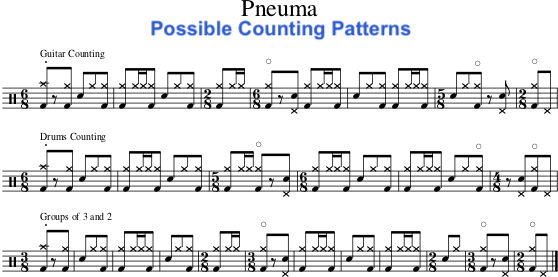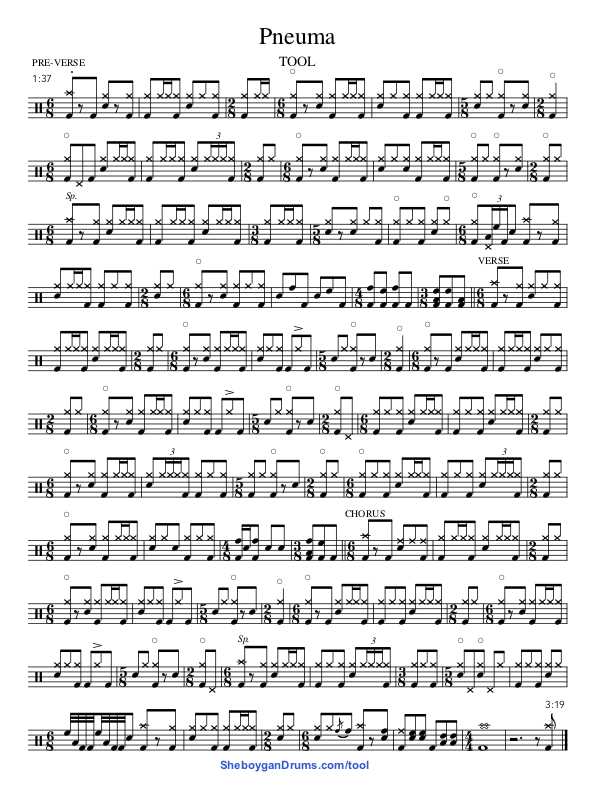TOOL – Pneuma: Drum Beat
Pneuma
This Pneuma drum part sheet music shows suggested counting patterns for the verse and chorus in Pneuma. There are a few comfortable ways to count the Pneuma drum part as shown in the examples below.

You may want to learn the basic patterns without 16th note and open HH parts. This is a great way to get comfortable with the Pneuma beats. I’ve made a simple version for this purpose.
How to Count Drum Part for Pneuma by Tool
As with other Tool songs, Pneuma contains odd and changing time signatures and phrase lengths. And as usual, these phrases can be reduced to smaller groups of notes and measures to make things easier.
I initially notated the drum part 5 different ways, looking for the best interpretation to learn and perform the drum part. You can see 3 of the versions in the counting options excerpt below.
After trying it each way, I settled on the version in the PDF above because it aligns well with the guitar part. If I were not taking the guitar part into consideration, I would have written measure 3 as 5/8 instead of 2/8.
Pneuma Drum Part Counting Options
These are the 3 notation options I find most practical. I use the first option in the sheet music PDF, but all 3 are viable. Use the one you prefer.
I included the Groups of 3 & 2 because this can be a nice way to break down complex and odd time signatures into easy groupings. If you’re not comfortable counting in odd time signatures like 5 and 7, this can be a great way to learn drum parts that may otherwise be notated as such.

Pneuma Drum Notation Legend
TOOL – Pneuma: Drum Beat pg. 2– PDF Download
TOOL – Pneuma: Drum Beat SIMPLE pg. 2 – PDF Download

[form form-4]


I came across a video lesson for the bass part that had it written as 2 bars of 7/4 and a bar of 5/8. That makes it much easier to count. It’s basically a 3 over 2 polyrhythm in 7/4 with a 5/8 turnaround.
Great! That’s the right number of beats for the first 2 phrases; after that, the 7/4 and 5/8 wouldn’t continue to work. I don’t know what the bass guitar part looks like, but glad you found an easier way to count it.
This is great stuff! As an experienced drummer myself, I enjoyed how everything was broken down into as simple a format as was possible. Odd-time counting can be daunting for anyone at times, especially novice players.
I’ve been playing in rock/metal bands since 1983, and have developed my own way of breaking down drum parts. When creating original music, I write what I’m working out in my head. I hope everyone enjoys this system you’ve created!
Tim, thanks for stopping by!
I found that the easiest way to count the verses for me is:
1-2
1-2-3
1-2
1-2-3-4-5-6
1-2-3-4-5-6
1-2
1-2-3-4-5-6
1-2-3-4-5-6
Thanks for sharing. Great that you found a pattern that it works for you.
These Tabs are just awesome man! Actually the best I could find. I really really want to learn the whole song with your tabs. I hope I will receive all the missing parts soon. Thank you !
Glad you found the Pneuma drum part helpful. Super fun to play. -Jamison
Hi, great work with the pneuma Drumbeat ! I prefer to count 12 – 2 / 12 – 2 – 5 , because of the repeating 12 – 2 seems easyer, but thats a question of taste i think. Have you check out the ‘Child’ Part after first Chorus? > Danny playes over the main structure a 7/8 + 7/8 + 5/8 + 7/8 + 7/8 figure. It’s so insane! XD
Cool! Thanks for the comment. Agreed, use the counting you like best. Your equation of 12-2-12-2-5 is easy to remember because it uses one repetition of each group. (As opposed to mine which has two 6s instead of one 12.)
Generally students are more comfortable counting 6 or 3 than 12. In this Pneuma part, 6 is super comfortable to count.
In general 6 is easier to count than 12, but not a big deal for experienced drummers. Since experienced drummers will devise their own method and don’t really need a tutorial, this is directed toward new or less-experienced drummers, hence the goal of simplicity.
For Verse 2 instrumental starting at 4:27, I really like 5-7-5-7-3-6, and I count the 6 as 3/4 instead of 6/8. As with my suggestion for the intro and Verse 1, this is a nice way to count it because it aligns well with the distorted guitar part.
For anyone not comfortable with 7, it can be counted as 4-3 instead of 7. Then the resulting equation is 5-4-3-5-4-3-3-6.
To me, the 7-7-5-7-7 makes sense if you start counting on the pickup notes, two beats before the measure begins. Curious how you’re subdividing the 7s and 5s in this method.